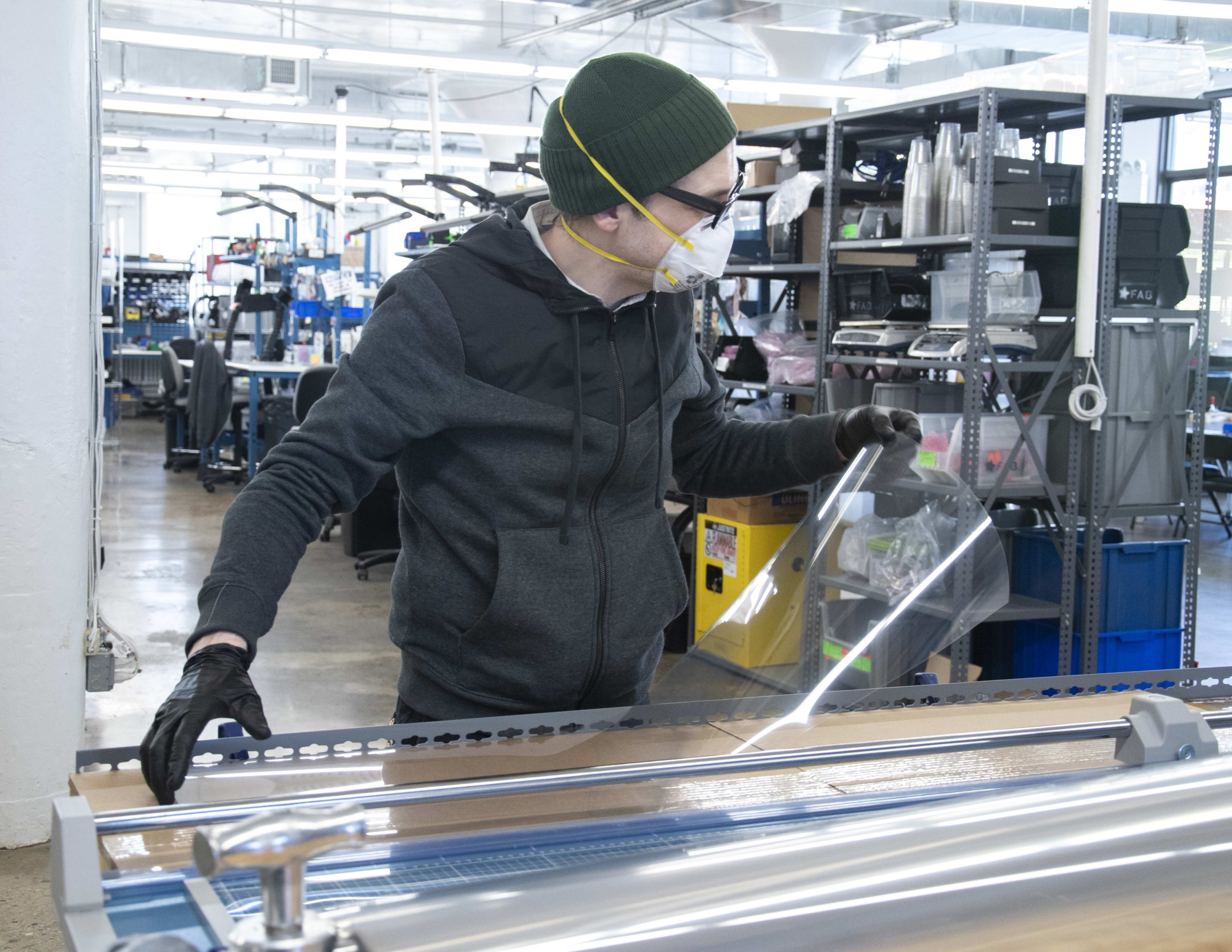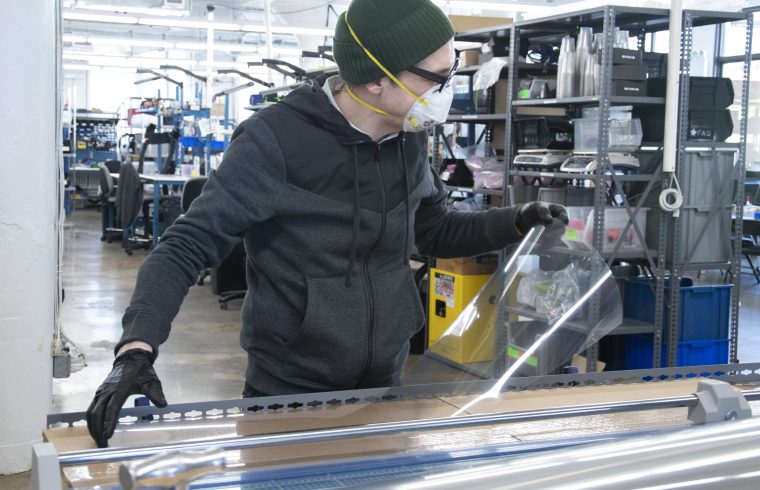
A worker at NYC-based tech company Adafruit makes a face shield during the coronavirus pandemic in 2020.
Adafruit.com
Across New York City, businesses hardly resemble their pre-pandemic operations. Fashion designers are sewing face masks instead of garments, restaurants have transformed into grocery stores and distilleries are making alcohol that’s too strong to drink.
Kings County Distillery in Brooklyn is one of those businesses. It began making hand sanitizer after the federal regulators gave the OK in late March.
“We kind of were playing around with the idea of doing it and it just felt in bad taste for a while,” said the distillery’s co-founder Colin Spoelman. “But then all the sudden things got so serious that in fact everyone got serious about it in a way that it was clear it would be helpful.”
To meet medical standards, the distillery had to make much higher-proof alcohol than the whiskey it was used to producing. That meant changing up the distilling process and slowing it down, Spoelman said.
But the demand was there. Kings County produced 1,000 bottles of hand sanitizer in its first batch and sold out in four hours, according to Spoelman.
Business owners like Spoelman have been pinpointing the places demand has shifted during the Covid-19 crisis and figuring out ways to move their businesses along with it. For many New Yorkers, it’s a feeling that calls back to 9/11, when the entire city was thrust into a new reality and neighbors worked to figure out how to help one another. This time, New Yorkers are rebuilding from a safe distance apart and often over the internet.
Digital expansion
In addition to making hand sanitizer, Kings County Distillery recently started selling whiskey and “virtual tastings” online, after the New York state agency regulating alcohol sales loosened its restrictions on online transactions.
“We had to pivot from being a government-mandated analog business to a government-mandated virtual business,” Spoelman said.
Kings County Distillery has shifted its whiskey production to hand sanitizer during the coronavirus pandemic in 2020.
Kings County Distillery
At Swerve, a New York-based spin studio, bringing together sweaty bodies in small classrooms felt untenable by the end of the second week of March, according to the studio’s founders. The business decided to shut its doors shortly before the city mandated gym closures.
These days, Swerve looks less like SoulCycle and more like Peloton, having rented out all 150 of its (sanitized) bikes to customers who agreed to pay $ 325 per month for the equipment and unlimited access to streamed classes. For customers who don’t have access to a stationary bike, Swerve is also offering home workouts that don’t require equipment. For those, users can choose what they pay starting at $ 10 per class, with most of the fee going to the instructors, the founders said.
The crisis has given Swerve an opportunity to experiment with a new idea without sacrificing resources from its core business, and customers have been forgiving as Swerve has ramped up an entirely new product over just a few weeks, said co-founder Chelsea Kocis.
“It kind of forced us to try something that we didn’t really have the bandwidth to think about in the past,” Kocis said.
“We probably wouldn’t have entertained this as soon as we did if it wasn’t for the pandemic,” agreed co-founder JH McNierney. “It forces us to be nimble and try things that we hadn’t done in the past and receive feedback from riders.”
Junzi Kitchen has also expanded its reach during the crisis, delivering far beyond its Manhattan-based locations into the outer boroughs. The Chinese fast-casual chain served to a lunch crowd of students and office workers, but now is delivering bulk ingredients that customers can put together themselves, or combine with whatever they have in their pantry to stretch out their meals.
Junzi co-founder and CEO Yong Zhao said he looked at how his friends in China were getting their meals shortly before the virus reached the tipping point in New York that forced residents to retreat to their homes. Those friends said they were placing larger orders to feed their families.
“Home eating is a totally different experience,” Zhao said.
Junzi has also rolled out a series called “Distance Dining,” converting its regular in-person chef-led dining experiences to an online experience. Junzi sends three-course meals to participants who later follow the chef’s plating instructions and stories over a livestream on Instagram. In its first couple weeks, the program sold out even after expanding its supply to 125 meal kits in its second week.
Junzi Kitchen has introduced its Distance Dining series during the coronavirus pandemic in 2020, where a chef directs plating instructions over a livestream on Instagram.
Junzi Kitchen
Junzi is also giving customers the option to buy a meal for a hospital worker, which has allowed the company to maintain delivery work for its catering staff.
“Every day it’s tiring because of all the new things we need to do, but at the same time we’re kind of excited… to help make our contribution to society more than before because right now we have the capacity to make the changes,” Zhao said. “Now it’s kind of [like] all these side projects have become the main project and the main projects before have become the side project.”
Making essential supplies
Some small businesses in New York have shifted nearly their whole operations to creating supplies needed by hospital workers or other essential services.
Adafruit is one of those businesses. The tech company had already been deemed an essential service because it manufactures a computer component used in medical devices like ventilators, but it has since begun producing face shields as well. Of the company’s 100 New York-based employees, it has about 10 on the factory floor at a time, though it says it has retained all its staff.
For workers whose jobs don’t require them showing up to the office, Adafruit is encouraging them to take part in skills-building and learning various internal systems.
“You know how companies say, ‘well, if we only had time to train everyone to do everything?'” said Managing Director Phillip Torrone. “Well, we do.”
Some employees are even developing an internal app so Adafruit workers can do their own contact tracing to keep track of where they have been in case they were near the source of an outbreak. Torrone said the company wanted to create a privacy-centric app so its employees wouldn’t have to rely on a product from companies like Apple or Google, which have since announced plans to jointly launch tools to track the spread of the virus.
Brooklyn and Staten Island-based crafting workshop MakerSpace has shifted its business to making face shields as well. The business typically conducts educational programs and maintains a membership of artists and craftsmen who rely on the facilities’ industrial tools. Executive Director Scott Van Campen said 15% to 20% of their revenue usually comes over the next few months from educational programs which have since been suspended.
In the meantime, like Adafruit, MakerSpace has been coordinating with the New York City Economic Development Corporation to manufacture face shields. The work has allowed them to maintain about half of its 10 or so shop tech staff and managers, according to Van Campen.
Workers at MakerSpace in New York City make face shields to assist with relief efforts during the coronavirus pandemic.
MakerSpace
The NYCEDC has helped connect businesses that are looking to help, identifying companies with the space or the resources to produce important supplies.
“Our supply chains across the country have gone a little bit haywire so we’re relying on our partners to produce the raw materials to create these goods,” said James Patchett, president and CEO of the group, which has been coordinating with the city’s department of health to figure out which supplies are in the most demand. He said the ability to give New Yorkers work and create essential materials is “a rare win-win at these times.”
So far, the NYCEDC has contracts with eight NYC-based companies making 200,000 face shields per week with the goal to ramp up to 600,000 per week by the end of April. Fashion and garment workers are sewing face masks for health care providers as well and the NYCEDC is planning to build a new supply chain to make up to 50,000 test kits for the coronavirus per week beginning in May.
Lindsay Clinton, an executive vice president at the NYCEDC who has led the sourcing initiatives for these supplies, said part of the reason the city has been able to stand up these projects is due to the diversification efforts the group undertook after the 2008 financial crisis to create more sectors outside of financial services.
“New York City is now a very tech-driven economy but we also have a very strong computer and life sciences sector now,” among others, Clinton said. “That focus on diversification ten years ago set us up well for right now.”
Van Campen is still uncertain about MakerSpace’s future, knowing it could take a while to gain back his roughly 250 members and bring them to gather in a physical space. The team has been applying to grant and loan programs for small businesses, including the one from the U.S. Small Business Administration, for which Van Campen said the paperwork itself was “a full-time job.” His wife worked on the application while he sourced supplies for face masks, but the SBA program ran out of money on Thursday.
For now, small businesses are doing what they can to maintain at least some of their workforce and assist the recovery effort.
“I just wish I could make coronavirus testing kits,” said Spoelman of the Kings County Distillery. “But I can’t. I can make hand sanitizer, so I’ll do that.”
WATCH: Bakery closing permanently due to COVID-19 making cakes for NYC hospital workers







